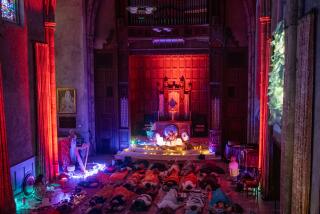‘Silent’ Worshiping Quakers for First Time Considering the Sound of Music
- Share via
In a Quaker branch that cherishes “silent” worship, open to God’s inward leading and not cluttered by human-devised programs, strains of music have begun, tentatively, to penetrate the quiet.
“It’s a very new thing for us,” says Mary Moehlman, publications manager of Friends General Conference and in charge of its unprecedented project to develop a hymnal for use in worship.
“Some feel singing is appropriate in worship, that there’s a great need for it,” she says. “Some feel it’s totally inappropriate, even shocking.”
In any case, it’s the first time in history that this major Quaker branch has embarked on producing a hymnal intended as suitable in worship and recognizing music as ministry.
Other major Quaker branches, the 58,000-member Friends United Meeting and the 24,000-member Evangelical Friends Alliance, commonly use hymns in worship, and have pastors, similar to other Protestant churches.
But this is not generally the case for the 32,000-member Friends General Conference, based in Philadelphia. A survey found that some local “meetings” use music, but many don’t and actively oppose it. Some say they’d like to use music, but don’t know how.
‘Good Deal of Diversity’
“There’s a good deal of diversity,” says Moehlman. “That’s what makes it exciting. It’s a new ministry of music among Friends.”
The project was launched in 1986, with a target for completion in 1991.
A dozen other denominations also are revising their hymnals, but for the Quakers, it’s venturing into thoroughly new territory.
Reaction “goes beyond the usual recent controversies surrounding other denominations’ new hymnals, although you can be certain that we’ll have at least some of those arguments as well,” Moehlman says. “It’s real scary, but a lot of fun.”
The old tradition among Quakers, whose keen social consciences made them early leaders against racism, war and injustices to Indians and prisoners, calls for “silent” worship, listening for promptings from God.
Meetings may be spent in total silence, which “can be rich and deep,” Moehlman said, or someone, when moved, may speak, usually briefly.
In an interview, Moehlman described “silent” meetings this way:
“It’s a sense of expectant waiting for the Lord. Whatever God speaks to any one of us, so we speak to the meeting. The weight of tradition is not to put any human-made thing into worship, something planned that might short-circuit the waiting.
‘Can Stay Out of It’
“We human beings stay out of it and let God direct it right then and there. The past feeling was that music was something not from God and so was not to be accepted. To have music could distract from hearing what God had to say. Music was frowned on, not only in worship but in other ways.”
Reasons for that view, she said, were that Scripture offers no foundation for formalized, planned singing in worship, nor for “artificial music” by organs or other instruments.
The Friends General Conference has had a hymnal since 1923, the last edition published in 1955, but it was intended only for Sunday schools, called “First-Day Schools.”
However, some meetings have begun using that hymnal in worship, “a relatively new practice,” Moehlman said.
More to Read
Sign up for Essential California
The most important California stories and recommendations in your inbox every morning.
You may occasionally receive promotional content from the Los Angeles Times.












